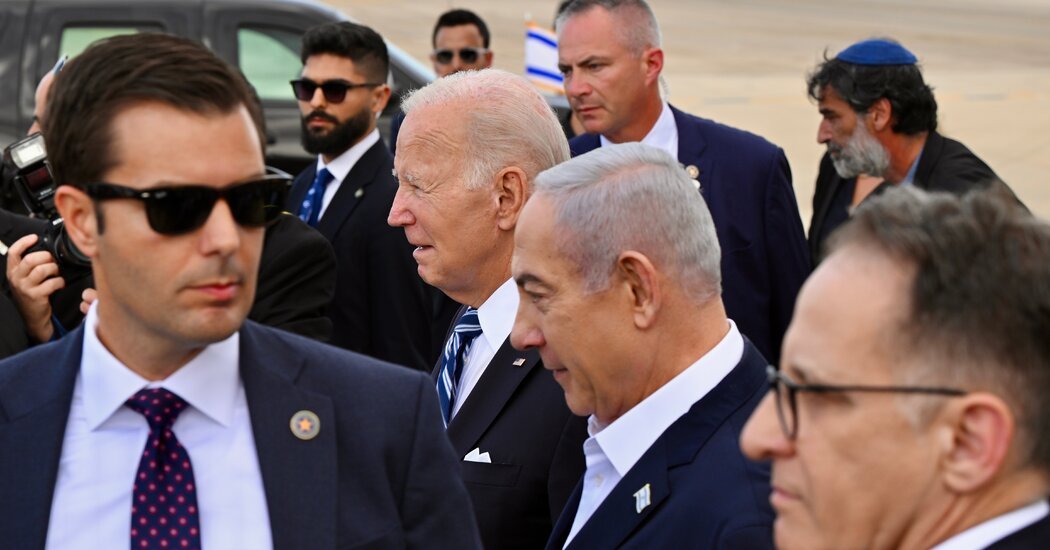A White House spokeswoman said on Wednesday that the Israeli government had agreed to try to reschedule a visit by a group of officials whose trip to Washington to discuss a possible assault on a key southern city in Gaza was scrapped over the U.S. decision not to veto a U.N. resolution calling for an immediate cease-fire.
President Biden had asked Israel to send a delegation to Washington to discuss alternatives to a ground offensive in Rafah, the southern Gaza city where more than a million people have sought refuge. But Israel’s prime minister, Benjamin Netanyahu, called off the delegation’s trip at the last minute after being angered by the U.S. decision to abstain from a vote on the resolution at the U.N. Security Council on Monday.
“The prime minister’s office said that they want to reschedule this meeting so that we can talk about the Rafah operations,” the White House press secretary, Karine Jean-Pierre, told reporters. “We welcome that. And we’re going to work with their teams to make sure that happens.”
There was no immediate confirmation of a desire to reschedule from Mr. Netanyahu’s office, which just hours earlier had issued a statement denying reports that a meeting was back on. “Contrary to reports, the prime minister didn’t approve the departure of the delegation to Washington,” the statement said.
On three prior occasions, the United States had vetoed a cease-fire resolution. But by abstaining on Monday, it allowed the resolution, which was less strongly worded than previous ones and called for a cease-fire for the holy month of Ramadan, to pass.
Mr. Netanyahu denounced the abstention in a statement, calling it “a retreat from the consistent American position since the beginning of the war.” The Biden administration insisted on Monday that the abstention did not signify a change in the United States’ position.
Friction between the two allies has increased over the toll on civilians in Gaza after more than five months of fighting set off by the Hamas-led Oct. 7 attack, which, according to Israeli officials, killed about 1,200 people.
Health officials in Gaza say that more than 32,000 people have died during the Israeli military operation, and the fighting has created dire conditions on the ground, with humanitarian groups warning of a looming famine.
Asked about Mr. Netanyahu’s earlier denial of reports that the meeting would be back on, Ms. Jean-Pierre was adamant that his office had agreed to try to reschedule.
“When we have a date, certainly we will share that with you,” she said. “That is what we know from our side.”
The announcement came a few hours after Israel’s defense minister, Yoav Gallant, wrote on social media that he had completed a successful visit to the United States. The trip coincided with the U.N. vote and its fallout.
During his visit, Mr. Gallant met with several senior U.S. officials, including Jake Sullivan, the national security adviser, and Defense Secretary Lloyd J. Austin III, who made Rafah a central part of his agenda.
After the meeting, a senior Defense Department official said Mr. Austin had presented the broad outlines of the Biden administration’s alternative approach to a major combat operation in Rafah, including a focus on precision targeting intended to root out Hamas leadership.
The official, who spoke on a call with reporters on the condition of anonymity to discuss confidential talks, said that the Israelis were receptive and that there would be additional meetings in the future.
Ms. Jean-Pierre said the United States remained hopeful that it could help broker a temporary cease-fire and a release of hostages held by Hamas.
In an interview with Israel’s Channel 12 aired Wednesday night, John F. Kirby, a spokesman for the White House’s National Security Council, acknowledged that the talks were stalling.
“We felt like the gaps were closing, and that we were getting closer to having a deal where we can get those hostages out,” he said. “Now it appears that we’re not moving forward, at least not in the way that we all had hoped, but that doesn’t mean we’re going to give up the effort.”
Johnatan Reiss contributed reporting.




